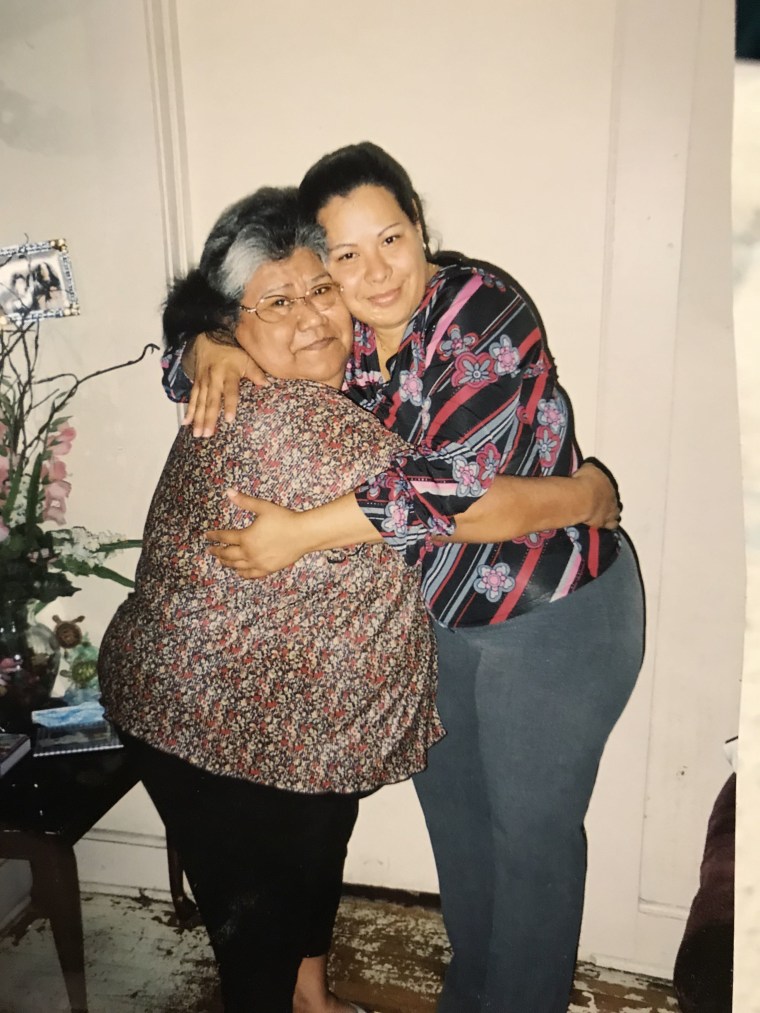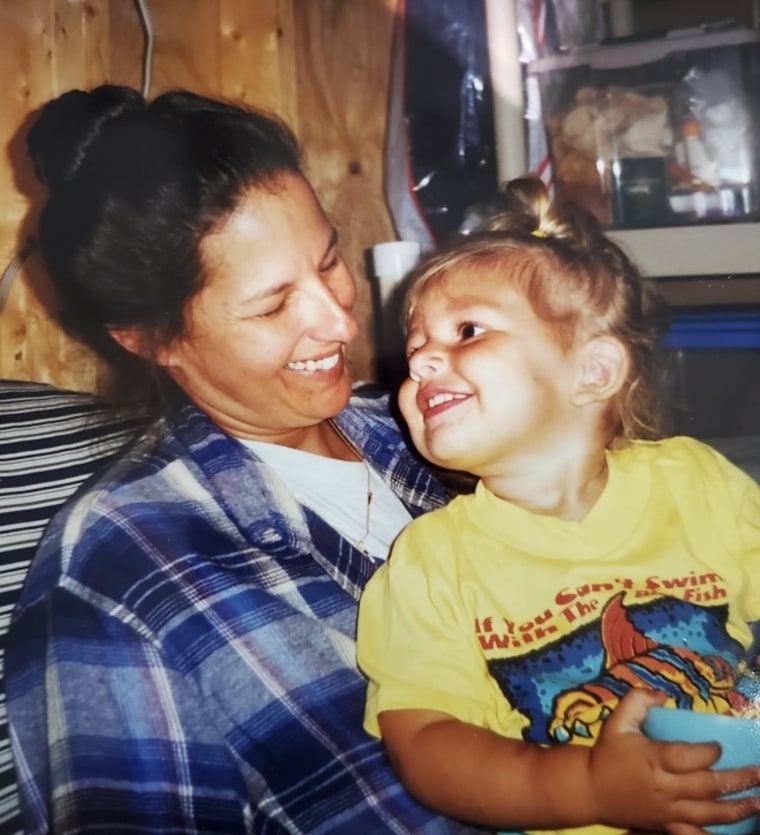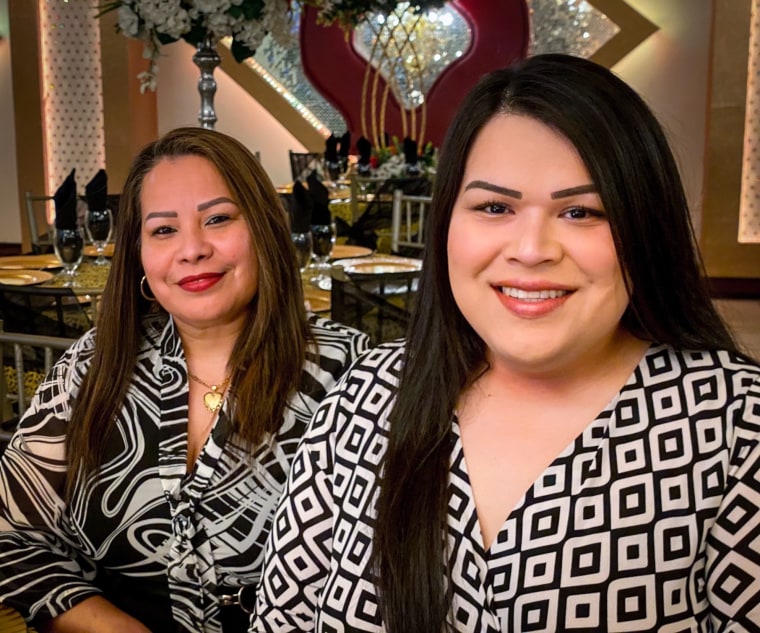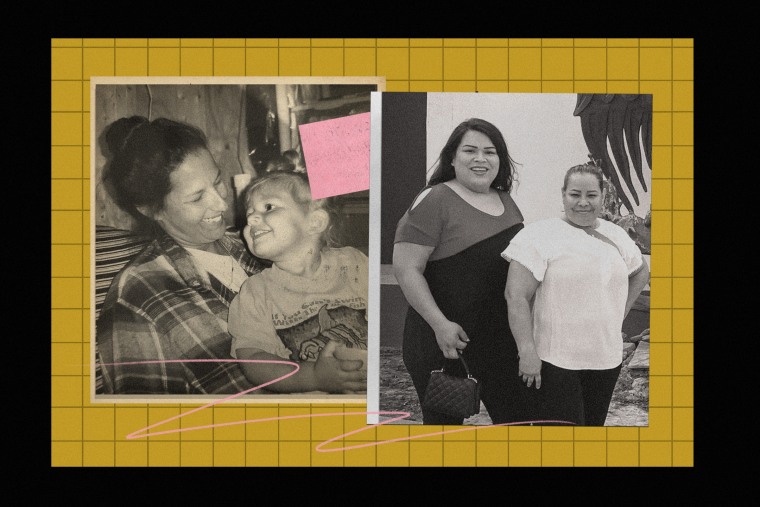Stacey Monroe came out to her aunt as gay when she was 13, because she felt like her grandmother, who raised her, wouldn’t understand.
She said her tía — which means “aunt” in Spanish — was immediately supportive and eventually helped facilitate conversations between Monroe and her grandmother to help the teen come out. Tía Mary told Monroe’s grandmother that the young woman knows who she is, “so it’s just a matter of letting them be,” Monroe recalled.
“It was really nice to have that support, because my mom respected her a lot,” Monroe, who lives in Dallas, told NBC News, referring to her tía and her grandmother, whom she calls “mom.” “My mom was able to slowly learn from her and get that knowledge and education from her and just have those uncomfortable conversations, because she was almost like that mediator.”

Mary continued to support Monroe after she came out as transgender a few years later, even when Monroe’s grandmother initially didn’t support her.
A study published last month in Socius, an open-access journal of the American Sociological Association, found that aunts play a crucial role in supporting their young relatives who are lesbian, gay, bisexual, queer and transgender, including by preventing them from experiencing homelessness if their parents are less supportive.
The paper, “Aunties, Aunts, and Tías: The Forgotten Othermother Supporting and Housing LGBTQ Youth,” is the first research on LGBTQ youth and aunthood and is part of a larger two-year longitudinal study on LGBTQ youth, support from family members who aren’t parents and housing stability.
The researchers interviewed 83 LGBTQ youth in South Texas and the Inland Empire of California in 2022 who reported ambivalence or low support from their parents regarding their identity. Of those youth, 38 mentioned their aunts when asked to identify their most important nonparental relatives, with an additional 12 describing someone who played an aunt-like role but who they weren’t biologically related to.
Brandon Robinson, lead author of the paper and chair and associate professor of the University of California, Riverside’s gender and sexuality studies department, said a key takeaway from the interviews was how meaningful the love and support of an aunt was to youth who don’t have supportive parents.
“You could just tell how much it meant to them to have this adult family member, this aunt, who just saw them for who they are, loved them for who they are and who will do anything for them,” Robinson said. “I think oftentimes we miss this, because so much research focuses on the parent-child dynamic or parents rejecting their child, and we’re missing that there are actually adult family members such as aunts who are deeply loving and supportive.”
The study — which Robinson co-authored with Amy L. Stone, a professor of sociology and anthropology at Trinity University, and Javania Webb, a postdoctoral researcher at the University of California Riverside — noted that 1 in 10 youth from 18 to 25 experience housing instability in the United States every year, and LGBTQ youth make up about 40% of that population, with Black and Latino transgender youth disproportionately affected.
More than 80% of the youth in the study were Latino, Hispanic, Black, Asian, Indigenous or another racial identity that is not non-Hispanic white, and nearly 70% of the youth were trans, nonbinary, gender-nonconforming, questioning or another gender identity that is not cisgender, meaning their gender identity doesn’t align with their sex assigned at birth.
The study authors cited past research that found “extended family members are a central part of Black, Latinx, Asian, Indigenous, and low-income family life,” and Black and Latino LGBTQ youth and adults are significantly more likely to describe maternal family members such as mothers, sisters, grandmothers and aunts as supportive figures. As a result, the study authors wrote, their research builds on theorizing about “othermothers,” using a term from social theorist Patricia Hill Collins in her book “Black Feminist Thought.”
Robinson, who uses they/them pronouns, said study respondents described three types of support that their aunts or aunt figures provided: LGBTQ-specific support; anticipatory housing support, which means their aunts preemptively offered to house them if they became homeless; and actual housing support.
For example, Biscuit — a nonbinary, Hispanic 16-year-old from San Antonio, who uses he/they pronouns — said their aunt crocheted them a blanket in the colors of the nonbinary flag and went to a local LGBTQ group to become more informed about the community.
“I feel much more safer, like I have a second plan if things go downhill, and I know someone will always be there for me when I need some space away from my family and I know I can rely on her,” Biscuit — who, like the other youth in the report, is only referred to by a pseudonym — told the study authors.
Carson Hartlage, 25, uses they and he pronouns and described receiving similar support from two of their aunts after they came out as transgender and their parents weren’t as supportive.
“One aunt sent me a tie when I started medical school interviews, which was a big deal to me, because my dad was no longer in the picture by that point,” Hartlage, who is in their second year of medical school in Cincinnati, told NBC News.

Aaron Buday, a hair stylist from Raleigh, North Carolina, who uses he and they pronouns, said his Aunt Cindi was similarly accepting after his parents didn’t initially react well to him coming out as trans in a letter to them when he was 16.
“I came out to her, and she was like, ‘OK, you’re my nephew. I love you,’” Buday said. “It kind of took me aback, because my letter to my parents was not that well received. It was basically like they needed a therapist to essentially explain it to them, but she didn’t need that. She was just ready to go, feet on the ground like, ‘Yep, that’s who you are.’”
Hartlage, Buday and Monroe all told NBC News that their aunts would also ask thoughtful questions about their lives or would check in on them about how their transition was going in ways that other family members didn’t, and they all said it had a positive effect on them.
Monroe said her Tía Mary “led with curiosity, versus rejection” and “was just wanting to learn more.” Like some of the youth in the study, Monroe said her tía would also intervene when other people would misgender her, using incorrect pronouns, or deadname her, using her previous name. Monroe said Mary would correct them by saying something like, “She’s Stacey, now, remember?”

One 2019 survey found that LGBTQ youth who reported having at least one accepting adult in their life were 40% less likely to report a suicide attempt in the past year, according to The Trevor Project, a suicide prevention and crisis intervention nonprofit.
Some of the youth in Robinson and Stone's study said their aunts offered to house them should they fear becoming homeless due to their parents' lack of acceptance. That type of support, Robinson said, is important, “because the youth might not be as afraid to come out in the parental home, be afraid to talk about gender and sexuality in the parental home, if they knew they have a place to fall back on that wasn’t the street or homeless shelter.”
Robinson said many youth revealed their uncles were also supportive but weren’t engaging in as much active support as their aunts were, such as correcting other family members who misgendered them.
“There’s something about aunts and the gendered work that women often do in patriarchal society, and the care work that women often do, this kind of devalued work that is so crucial to holding society together, that I think this part is largely falling on aunts who are doing the active, instrumental and material support in ways that uncles aren’t,” Robinson said.
Robinson said their next paper will examine the kind of support grandparents provide, which many youth said revolved around food.
Monroe said she stopped by Tía Mary’s last week with her sister, and they all caught up over pan dulce, which are Mexican sweet breads.
“The fact that she was just so supportive from the beginning, that really helped, because I don’t think that I would be the person I am today without that,” she said.

